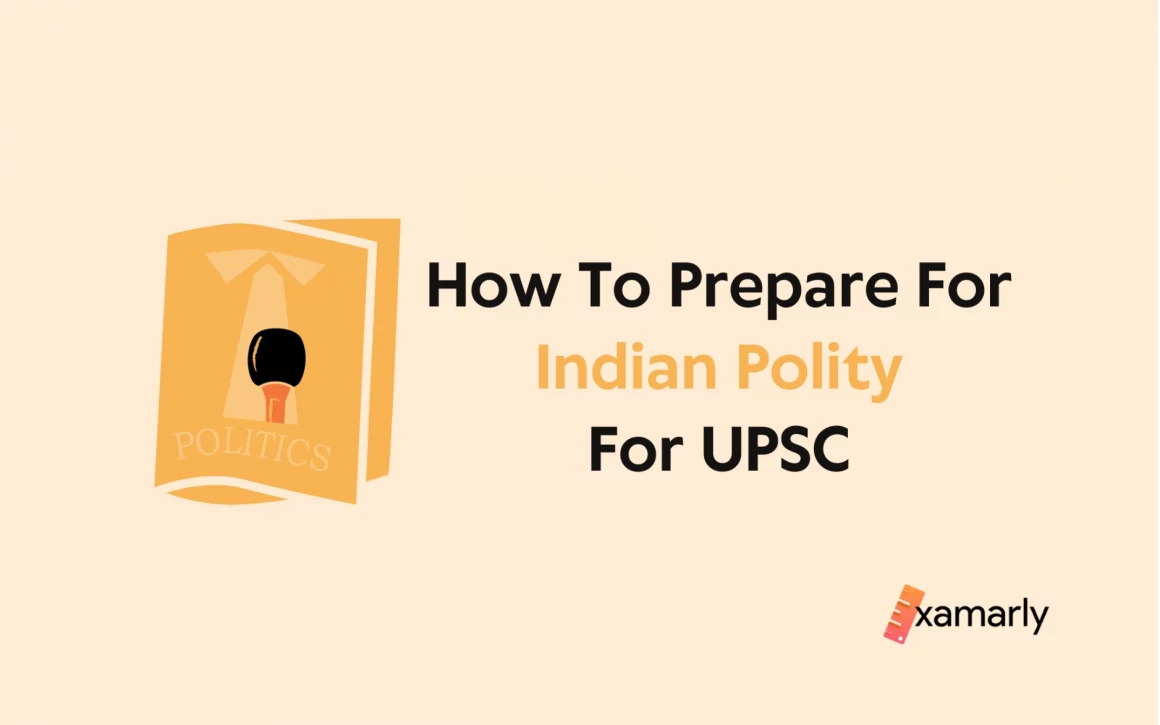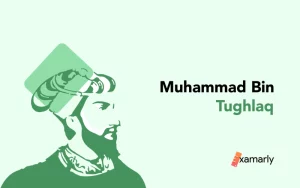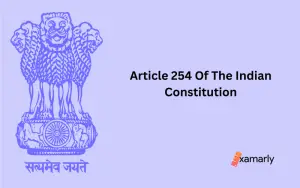Indian Polity is an important portion in all three stages of the UPSC CSE exam, be it the prelims, Mains, or the interview round.
Indian Polity gives an understanding of various constitutional provisions & institutions, authorities & their appointment, and the working of Legislature (Lok & Rajya Sabha), Executive, and Judiciary in India.
On the other hand, international politics and relations provide the concept of how international events affect national policies and responses. You can check here the political science optional syllabus for UPSC.
In this article, we will help you on your quest of how to prepare for Indian polity for UPSC.
- Indian Polity in UPSC Exam
- Weightage of Indian Polity in the UPSC Exam
- Advantages of Indian Polity in UPSC
- Disadvantages of Taking Indian Polity as an Optional Subject
- 5 Tips to Prepare for Indian Polity for UPSC
- 1. Understanding the Basics of the Constitution through NCERT and Other Books
- 2. Facts and Figures are an Important Part of Polity
- 3. Read IGNOU/NIOS Notes
- 4. Current Affairs for Indian Polity
- 5. Solving Mock and Topic-Wise Tests with Previous Year Question Papers
- Comprehensive Book-List of Indian Polity for UPSC CSE
- How to read Indian Polity by Laxmikanth?
- Conclusion
- FAQs on How to Prepare for Indian Polity for UPSC
Indian Polity in UPSC Exam
It is not only an important subject of social science but it also creates a sense of awareness about one’s responsibilities, rights, duties, current issues, and the schemes, policies, functioning & responsibilities of the Government.
The subject is of significant importance in every citizen’s life and remains significant for a Civil Servant throughout his/her service as it forms an important part of the administration.
Before knowing the tips and methods on how to prepare for Polity for UPSC CSE Exam, let us consider the various aspects like weightage, advantages, and disadvantages of this subject in the UPSC CSE Exam.
Weightage of Indian Polity in the UPSC Exam
1) Prelims
A total of 100 questions are asked every year in the UPSC Prelims General Studies paper. In 2022, 10 questions were asked from this section. In 2021, 18 questions were asked and in 2020, 17 questions were asked ranging from easy to moderate. This shows the significance of Indian Polity in the Prelims examination.
You Might Also Like To Read: Subject Wise Preparation Strategy For UPSC Prelims.
2) Mains
UPSC Mains Exam has a separate section for Indian Polity in the form of GS-2 Paper consisting of topics like Governance, Constitution, Polity, Social Justice, and International Relations.
Both, the Prelims and the Mains examination demand a subjective understanding of the subject. You can opt for a political science optional for UPSC also in the Optional Paper-1 section of the Mains examination.
Studying polity for prelims and mains General Studies Paper-2 is compulsory for everyone, but polity remains one of the most preferred UPSC optional subjects among the aspirants.
Related Article: How To Prepare International Relations For UPSC.
Advantages of Indian Polity in UPSC
1) Prelims
Polity is quite a relevant subject to our everyday life as compared to other subjects in UPSC Exam. You can read and learn it without getting bored because it’s a fact that we all are surrounded by political debates & schemes around everyday events of national and international interest.
In this way, you can prepare your subject along with being updated with the latest news using the best current affairs magazine for UPSC.
2) Mains
The Mains section demands a subjective approach and for that, you need to prepare yourself for opinion-based answers. Polity is a very good option to choose as an optional. While preparing for your optional paper you can also cover your GS-2 area which is Political science and Governance. Hence by applying this scheme to your preparation, you can shoot two birds in a single stone.
Since polity overlaps with current affairs and is related to everyday events, you have something to write in almost every question.
You Might Also Like To Read: How To Prepare Current Affairs For UPSC.
Disadvantages of Taking Indian Polity as an Optional Subject
If you’ve passed the dilemma revolving around the question of how to select optional subject for UPSC, polity can be a good option. But everything good has it’s own disadvantages too.
- It is subjective and hence a low-scoring subject if we talk from the perspective of UPSC CSE Mains. Due to differences in opinions of different aspirants on various issues and matters related to polity, it is not easy for anyone to judge any answer as the perfect/ correct answer.
- Because of its advantages, it is also a highly-competitive optional subject for the UPSC Civil Services Exam.
5 Tips to Prepare for Indian Polity for UPSC
Effective tips and methods for preparing this subject for UPSC are discussed below to ace this paper in the UPSC CSE exam.
1. Understanding the Basics of the Constitution through NCERT and Other Books
- It is very important to first understand the Constitution of India. The Constitution is the source point of Indian Polity as every other concept is connected directly or indirectly to it. Reading and understanding the Constitution will help you greatly with your exam preparation.
- You can start with the NCERT books as this will give you a brief understanding of the subject from scratch.
- The renowned book on polity by Laxmikant will surely upgrade your level of understanding and will give you a new dimension in the IAS Prelims exam. It is a wholesome book, but aspirants are required to read it a minimum of 3 to 4 times to be able to understand it completely. It will definitely help with preparing polity for UPSC.
- If you read our article on digital vs. handwritten notes for UPSC, you’ll realize that handwritten notes are extremely important for polity. In the market, everyone can get notes and opinions. For your answer to be good and different from others, it is important to make your own notes.
2. Facts and Figures are an Important Part of Polity
Another important tip is to focus on facts and figures as well. As Prelims demand an objective approach, it is necessary to grasp things and matters related to your subject along while noting down important facts and figures.
You can use relevant facts and figures which you have learned specifically during your Prelims stage in your Mains answer as well. The use of facts and figures plays a crucial role to support your opinions and right a well-informed and thoughtful answer.
3. Read IGNOU/NIOS Notes
IGNOU/NIOS notes level up your preparation as these are authorized and well-curated, made for the University syllabus. These will surely aid your Indian Polity preparation.
4. Current Affairs for Indian Polity
The syllabus of UPSC CSE is incomplete without current affairs. The Polity section is not just about the Constitution and Articles of the Indian Constitution, but also asks questions about the latest Governing body and the working of the Government. Daily reading of current governance issues is important and should be on the priority list.
5. Solving Mock and Topic-Wise Tests with Previous Year Question Papers
Solving a number of mock tests before UPSC Prelims & Mains and previous year question papers is extremely useful and important for the UPSC exam.
Solving as many mock/topic-wise tests as you can, analyzing your mistakes, amending them, understanding the nature of questions, and repeating this process will ultimately lead you to the answer of your quest of. These should be on high priority in your UPSC preparation strategy.
Comprehensive Book-List of Indian Polity for UPSC CSE
One cannot ignore the list of standard books while conversing about the tips and strategies on how to prepare for Indian polity for the UPSC exam. Here is the booklist for UPSC by toppers that have helped them ace the UPSC CSE:-
- Indian Polity for UPSC CSE – M. Laxmikanth (5th Edition).
- Introduction to the Constitution of India (26th Edition) – Durga Das Basu.
- Our Constitution – Subhash C. Kashyap.
- Our Parliament – Subhash Kashyap.
- Objective Indian Polity: General Studies [Paper-1] – M. Laxmikanth.
How to read Indian Polity by Laxmikanth?
This book finds it’s place in almost all book lists available on the internet or suggested by UPSC toppers. You just can’t attempt the UPSC exam without going thoroughly through it. So for your ease of learning, here are some tips for reading it:
- Start by understanding the table of contents and the structure of the book to get an overview of the topics covered.
- Read the introduction and preface to get an idea of the author’s perspective and the purpose of the book.
- Go through the chapters one by one, making sure to thoroughly understand each concept before moving on to the next.
- Take notes while reading to help you retain important information and simplify complex concepts.
- Make use of headings, subheadings, and bullet points to quickly identify key topics and ideas.
- Highlight important sections, passages, and definitions, and revisit them regularly.
- Practice answering questions at the end of each chapter to test your understanding and identify areas that require more attention.
- Supplement your reading with additional resources such as videos, podcasts, and online articles to deepen your understanding of the subject.
- Stay updated with the latest developments in Indian politics and governance to keep your knowledge current.
Note:
It is important that in the first read, you understand the book and the syllabus covered. In the second read, make short notes and then further revise in the third and fourth read. Only after reading it several times can you make the most out of the book to attempt maximum polity questions correctly.
Other Blogs You Cannot Miss Out On:
- How Many Hours Of Study Is Required For UPSC.
- How To Read The Hindu For UPSC.
- How To Study The Hindu Newspaper Editorial For UPSC.
Conclusion
As discussed, Indian Polity is all around us in our day-to-day life, so it can be a subject that is comparatively easy to understand. But in the end, it all boils down to your preferences. Choosing Indian Polity as your optional subject for IAS mains can be both good and bad as discussed earlier. Choosing this subject will help you to prepare for UPSC Prelims and Mains together.
But the high competition rate can deter some aspirants. Keep in mind the tips provided by us to prepare for this subject. We hope we made some impact on your decision to choose Indian Polity as your optional.
FAQs on How to Prepare for Indian Polity for UPSC
How much time should I dedicate to Indian Polity?
Indian Polity is an important part of the UPSC syllabus and should receive adequate attention during your preparation. Aim to spend at least 4-5 hours a week studying this subject.
What is the best book for Indian Polity?
“Indian Polity” by M. Laxmikanth is considered to be the best book for Indian Polity for the UPSC exam. It provides a comprehensive overview of the Indian political system and covers all the relevant topics in detail.
Should I follow any specific study plan for Indian Polity?
It is advisable to follow a systematic study plan for Indian Polity. Start by going through the syllabus and creating a schedule that covers all the topics within the allotted time. Make sure to allocate adequate time for revision and practice.
Can I use online resources to study Indian Polity?
Yes, you can use online resources to supplement your studies. There are many websites, YouTube channels, and podcasts that provide informative content on Indian Polity. However, make sure to validate the information before using it and stick to trusted sources.
How can I improve my understanding of Indian Polity?
Reading newspapers and staying updated with current events in Indian politics can help improve your understanding of Indian Polity. Additionally, participating in discussions and debates on political issues can help you develop critical thinking skills and a deeper understanding of the subject.






